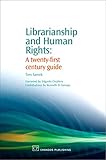Librarianship and human rights : a twenty-first century guide / Toni Samek ; foreword by Edgardo Civallero ; with contributions by Kenneth D. Gariepy.
Material type: TextSeries: Chandos information professional seriesPublication details: Oxford, England : Chandos, 2007Description: xxx, 200 p. ; 24 cmISBN: 9781843341987 ()hbk.; 1843341980 (hbk.); 9781843341468 (pbk.); 1843341468 (pbk.)Subject(s): Librarians -- Professional ethics | Library science -- Moral and ethical aspects | Social action | Libraries and society | Human rightsLOC classification: Z682.35.P75 | S26 2007
TextSeries: Chandos information professional seriesPublication details: Oxford, England : Chandos, 2007Description: xxx, 200 p. ; 24 cmISBN: 9781843341987 ()hbk.; 1843341980 (hbk.); 9781843341468 (pbk.); 1843341468 (pbk.)Subject(s): Librarians -- Professional ethics | Library science -- Moral and ethical aspects | Social action | Libraries and society | Human rightsLOC classification: Z682.35.P75 | S26 2007| Item type | Current library | Collection | Call number | Copy number | Status | Date due | Barcode |
|---|---|---|---|---|---|---|---|
 Book
Book
|
University of Macedonia Library Βιβλιοστάσιο Α (Stack Room A) | Main Collection | Z682.35.P75S26 2007 (Browse shelf (Opens below)) | 1 | Available | 0013100652 |
Includes bibliographic references and index.
Forward - Prefacio - Acknowledgments - Preface - About the author - Part One: the rhetoric - An urgent context for twenty-first century librarianship - Human rights, contestations and moral responsibilities of library and information workers - Part Two: the reality - Practical strategies for social action - Prevalent manifestations of social action applied to library and information work - Specific forms of social action used in library and information work for social change - Closing thought.
This is a direct challenge to the notion of library neutrality, especially in the present context of war, revolution, and social change. This book locates library and information workers as participants and interventionists in social conflicts. The strategies for social action worldwide were chosen because of their connection to elements of the Universal Declaration of Human Rights (1948) that relate particularly to core library values, information ethics, and global information justice. This book also encourages readers to pay attention to links between library and information work and the following solidarity rights not currently incorporated into any legally-binding human rights framework. The aim is primarily at librarians, archivists, educators and students. Content consists of essential concepts presented in accessible terms (e.g., critical librarianship, information ethics, global information justice, human rights), along with a practical orientation to action on contemporary issues (e.g., intellectual freedom, intellectual property, preservation, cultural destruction, censorship, public access to government information, commercialization, academic freedom, workplace speech, international relations, anonymity, privacy, confidentiality, human security, national security policies, transborder data flow, and information poverty).





There are no comments on this title.